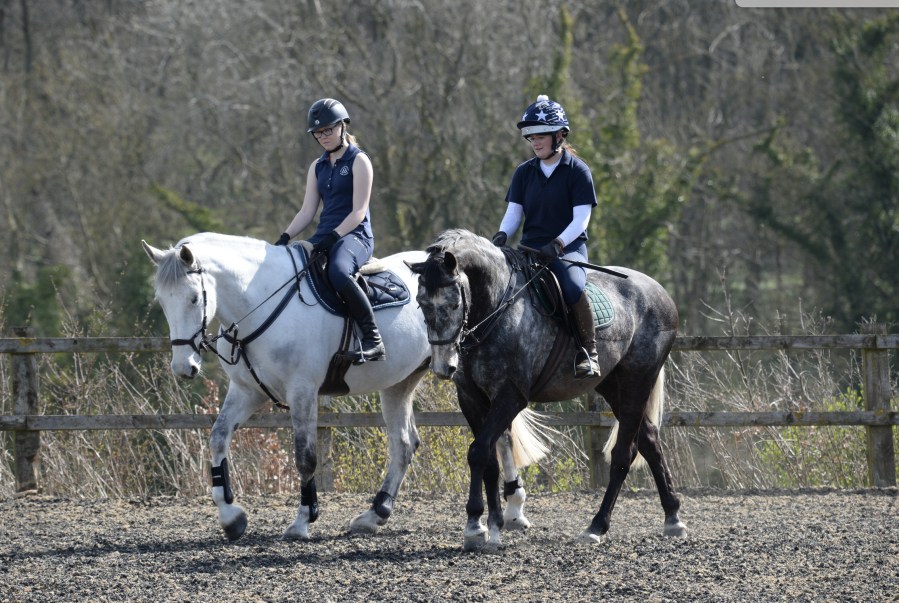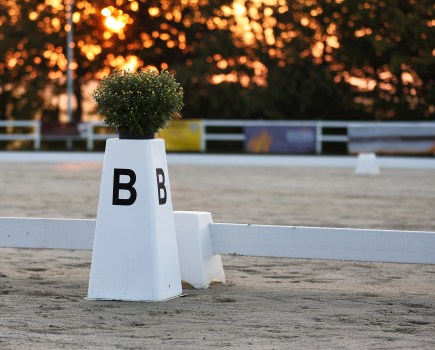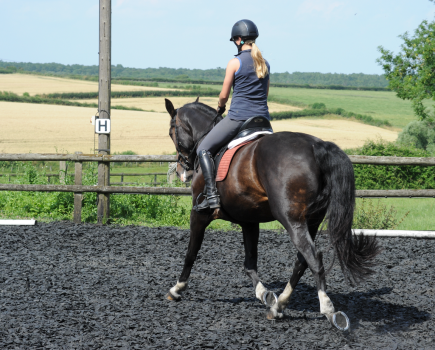Horse rider anxiety is a very common problem and, as is often the case with anxiety, it presents itself in a number of ways. For some people it’s over-thinking things, for others it’s doubting themselves, and for others it’s worrying about what might happen. A lot of anxiety problems are habits that riders have got in to and it takes roughly 100 repetitions of a new habit to get rid of the old habit. So, there is a lot of effort that has to be invested in change before you get the benefit of it.
Anxiety doesn’t just affect horse riders who compete; it can affect riders at all levels and with a range of experience. It is typically seen in riders who have had a break and gone back to riding later in life, or a rider who has got a new horse, or a young horse they are bringing on. The good news is that people can get past anxiety and enjoy riding again.
Horse rider anxiety issue: worrying what other riders think
What it means
This comes back to self-belief. When we try to validate if we’re a good person or not, we typically look internally and externally. If internally we don’t reinforce ourselves very positively and don’t have a lot of positive self-belief, we then become very reliant on external feedback from other people.
Symptoms
When riding in front of other people, such as on a livery yard or at a competition, riders worry about what other people think.
Solution
Work on developing some strong positive beliefs using evidence through what people say you do well as a rider. Ask people around you for positive things about your riding, and ask yourself what you are working on that is making you a better rider so you can start to build self-belief. You can also ask what your trainer thinks you are good at. Ask them to point out the things you are doing well as well as the things you can improve on, so you know what your strengths are as well as what you need to work on.
From there it is about focusing on what you can control, which takes you away from judgment thinking. When you are in task focus mode, you are focused on what you are doing — this means you can no longer be in judgment mode at the same time. Give yourself a checklist and focus on the process of doing a certain movement or task.
Top tip!
If you really struggle to ask for people’s opinions of you, start with a trusted friend and ask them what they think you do well as a rider. Share your achievements with friends, including on social media if you are happy to, but don’t spend too much time dwelling on and comparing yourself to others.
Issue: feeling nervous after a fall or accident
What it means
Riders relive an experience and fear the same thing happening again.
Symptoms
When someone experiences a traumatic event, they can relive the experience over and over again. Anyone who has a responsibility at home, such as children or being self-employed, is often more predisposed to reliving traumas of a fall compared with someone who doesn’t have those life responsibilities.
Solution
Often, riders can bounce back from a fall better if they are not reliving the experience, but with those who do relive it, you have to get professional help. We’re only talking one half-hour session to resolve the reliving of the experience. Trying to fix that yourself is very difficult.
The next consideration is how long you wait to get back in the saddle. There is an age-old philosophy that you should get straight back on, and although I agree it’s not good to delay unnecessarily, there is much to be said for waiting until you are physically able. When we’re not in great physical health, we are far more predisposed to anxiety, which could exacerbate the issue.
Relaxation
Next, examine what is going on in your mind and take note of any thoughts that you might have (‘what if’ thinking), addressing the memory of the fall and negative thoughts that go with it. You can then challenge them as explained before. When it comes to dealing with the physical symptoms of anxiety, I get riders to work on relaxation, doing a guided meditation or breathing technique to bring stress levels down. It tells your brain that when you’re in that situation, you don’t need to worry.
Top tip!
If you are reliving a bad experience, imagine you are watching that experience on a TV. This automatically disassociates you from it and starts to take some of the realness out of it. If you practice this often enough, you can disassociate yourself from the experience and help with your anxiety.
Horse rider anxiety issue: Thinking “I’m not good enough”
What it means
When a rider doesn’t think they are good enough, it fundamentally comes down to a lack of self-confidence.
Symptoms
Often, riders question what they are doing, which can lead them to not be decisive or not quick enough to make decisions, or they can overthink it which makes them override and overcomplicate things.
Solution
I advise riders to keep a journal of what they are thinking and try and work out the patterns in their thought processes. Typically, when you don’t feel good enough, it will relate to two or three things in particular, not necessarily everything. Becoming more aware of the thoughts going through your mind helps you understand what is causing you to feel like that. Once you have identified that, you can confront it and challenge it and ask, “Is it true all of the time?” Think of the times when you did feel good enough, which dispels the myth that you aren’t good enough all of the time.
“I am” statements tend to relate to our belief systems, so if you tell yourself you are not a good enough rider, it is typically a belief, so it’s about catching those and challenging them positively. Find evidence to challenge those thoughts, such as “I went on a hack yesterday and was fine, so I can’t be a bad rider all of the time”. You will make the negative thoughts less credible and real.
Top tip!
Have a plan in your mind about what you want to achieve in a session. Break it down into steps to work through and concentrate on them when you are riding. Imagine in your mind how you want your horse to go and how you will achieve that. By having a focus, you will be doing something positive instead of thinking of the negatives.
Horse rider anxiety issue: performance anxiety
What it means
Performance anxiety usually stems from someone feeling that something isn’t achievable. For example, competing in a dressage test at a new level for the first time.
Symptoms
Thoughts about what might go wrong or that you can’t do it can precede and create a feeling of anxiety, and once that takes hold, people can feel sick, their mouths go dry, they stop breathing properly, and they have an elevated heart rate. Horses are programmed to sense when another animal’s fight or flight sense is activated, so our physical anxiety symptoms make them think there is something to worry about, and it becomes a vicious cycle.
Solution
First, by addressing those thoughts, you can get rid of the physical symptoms. Be aware of what you are thinking and try not to dwell on it. If you allow a thought to pass instead of focusing on it, it won’t be so powerful and escalate into physical feelings. Second, take the pressure off yourself. If you are doing something for the first time, treat it as a data gathering exercise, an opportunity to baseline your performance on, rather than say it was good or bad, or pass or fail.
Whether you do it successfully or not, you are going to learn something. If you succeed, you learn that what you did works, and if you don’t succeed, you’ll learn what didn’t work. You can’t achieve something unless you start from a position of not being able to do something.
Fail to prepare, prepare to fail. Feeling fully prepared for something will also help ease anxiety, whereas not feeling ready will only add to it.
Top tip!
Focus on one step at a time and run through a checklist of what you are going to do in your dressage test or jumping round to keep you in the present moment.








